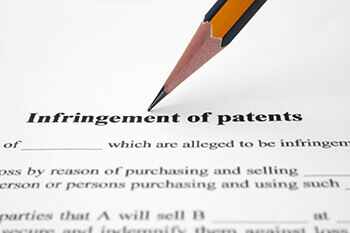Intellectual Property Law
What Does a Patent-Holder Have to Do to Prove Patent Infringement?
The patent holder must prove by a preponderance of the evidence (that it is more likely than not) that the defendant either directly infringed a claim of the patent, contributed to another’s infringement, or induced another to infringe.
For more information regarding the types of infringement, please see Types of Patent Infringement
In a case of direct infringement, the patent holder must prove that the defendant made, used, sold, offered for sale or imported the claimed invention. Direct infringement can be proven through literal infringement or through the doctrine of equivalents. Literal infringement occurs when a claim of the patent is a direct match when compared to the accused device or process. Under the doctrine of equivalents, infringement may be found where an element of the accused device, while not a direct match, is interchangeable with what is claimed. In other words, an accused product infringes if the equivalent element does the same work in substantially the same way to accomplish substantially the same result as the patented product or process.
In a case of contributory infringement, the patent holder must prove that the defendant sold, offered for sale, imported or exported a component that is a material part of a patented invention, and that the defendant knew that the component was made or adapted for use in the infringing product.
In a case of inducement, the patent holder must prove that the defendant actively induced another to directly infringe the patent holder’s patent, knowing that the acts they induced constituted patent infringement, and their encouraging acts actually resulted in direct patent infringement.
This requires that the defendant knew of the patent.

Catherine Rajwani
Principal Attorney
PHONE: 508-393-9244
EMAIL: crajwani@harborlaw.com
Catherine Rajwani is an intellectual property and business litigation attorney.
Ms. Rajwani handles a full range of intellectual property and business issues in her practice including patent, trademark, copyright, trade secret, contract and business tort disputes. She has participated in all phases of litigation, from pre-litigation counseling through trial and appeal, in federal courts throughout the country. She is also skilled in alternative dispute resolution proceedings.
Find out more about issues in our related practice areas
Intellectual Property Law
Trademark Protection
Trade Secrets
Copyrights
Patents
Intellectual Property Law
Insights, opinions and decisions you should know about

Defend Trade Secrets Act: Two Years Later
It has been more than two years since President Obama signed the Defend Trade Secrets Act (DTSA) into law, which created a federal, private, civil cause of action for trade-secret misappropriation in which “[a]n owner of a trade secret that is misappropriated may...

Where Do You Sue for Patent Infringement? – Proper Venue Post ‘TC Heartland’
In May of 2017, the Supreme Court unanimously reversed the Federal Circuit’s 25-year-old precedent on venue for corporate defendants.[1] Venue is the proper or most convenient location for trial of a case, and is governed by state and federal statutes. The 10-page...

Cost-Effective Mechanisms for Enforcing Intellectual Property Rights
In my practice, I counsel small and midsize business clients, many of which are astute with regard to securing their intellectual property rights. They have federally registered their trademarks with the U.S. Patent and Trademark Office, secured a portfolio of patents...

How Do I Defend a Patent Lawsuit?
The Top 5 Ways to Defend Your Company in Patent Infringement Litigation You discover that your company has been sued for patent infringement. After reviewing the patent cited in the complaint, you determine that the technology described relates to your company’s...
Get in touch with us.
Learn more about how we can help.